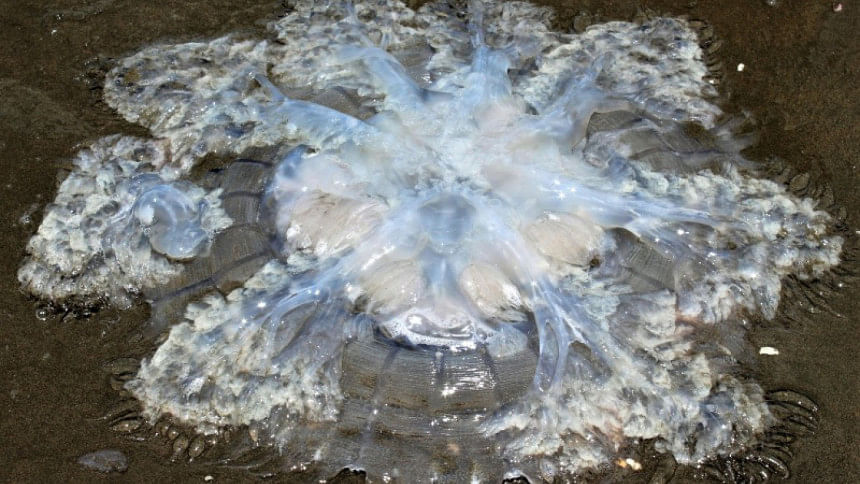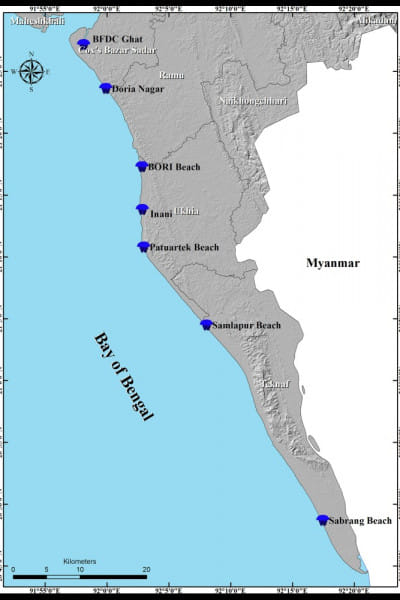Safe-to-Eat Jellyfish: A new seafood opportunity for Bangladesh

Would you ever consider eating jellyfish? For most people, the answer might be "no", as jellyfish often seem strange or even dangerous.
However, a new study revealed that the jellyfish species Lobonemoides robustus Stiasny, locally known as "Nuinna", could be safe for human consumption, potentially opening up new market opportunities for Bangladesh's fishing industry.
The study, titled "Heavy Metals and Proximate Composition in Jellyfish (Lobonemoides robustus Stiasny) Collected from Cox's Bazar Coast", was recently published in the Marine Pollution Bulletin.
For the first time in Bangladesh, researchers analysed the levels of heavy metals in this jellyfish species to ensure its safety as food. Samples were collected from various locations along Cox's Bazar coast, including Inani Beach, Patuartek, and Daria Nagar. Most of the heavy metals tested, such as calcium, sodium, selenium, and magnesium, were found to be within safe limits for human consumption. While a small amount of lead (0.39 parts per million) was detected, it remains within acceptable safety standards.

New Opportunity for Bangladesh
Given these findings, researchers suggest that Lobonemoides robustus could boost the fishing industry by enabling jellyfish exports to countries like China, Malaysia, Thailand, and Japan, where it is already consumed in salads and grilled dishes.
The study also highlighted the jellyfish's nutritional value, composed of 95 percent moisture, 3 percent protein, and 1 percent ash (mineral content). This makes it a potential food source, especially in regions where other resources are scarce.
According to the Food and Agriculture Organization (FAO), global jellyfish harvests, including from the Bay of Bengal, are on the rise. Harvesting jellyfish could help control their populations while offering a new seafood option.
Beyond food, jellyfish could serve other industries, such as cosmetics and health products, which often rely on natural ingredients. Researchers recommend ongoing monitoring of the marine environment to ensure seafood from the Bay of Bengal remains safe.
To ensure accuracy, the study employed advanced technology, such as Inductively Coupled Plasma Mass Spectrometry (ICP-MS), to measure metal levels and prevent contamination during testing. The research team included experts from the Bangladesh Oceanographic Research Institute, Sher-e-Bangla Agricultural University, and King Saud University in Saudi Arabia.
As Bangladesh explores its marine resources, jellyfish could become a valuable addition to the seafood industry, boosting food security and the economy.
Simul Bhuyan, a scientific officer at the Bangladesh Oceanographic Research Institute, said, "A significant number of jellyfish are caught when fishermen go to sea, but they are often discarded due to a lack of awareness about their potential uses. In our study, we found that this particular jellyfish is safe to eat, and it could also benefit the economy."
Bhuyan added that turning jellyfish into a viable seafood option could create a new industry in Bangladesh. "There is currently no jellyfish industry here. If we start exporting them, it could generate substantial revenue for the country," he said.
Jaynal Abedin, chief adviser of the Cox's Bazar Fisheries Traders Union Cooperative Society, echoed this sentiment. "If the government takes effective steps, fishermen could sell jellyfish in the market," he said.
Currently, large numbers of jellyfish caught by fishermen go to waste due to low demand.
Zillur Rahman, acting director general of the Department of Fisheries, added, "People in many other countries eat jellyfish, and there is a high demand for it. If we can make jellyfish safe to eat and export it, it could help us earn more money from foreign trade."
Mir Mohammad Ali, assistant professor at the Department of Aquaculture at Sher-e-Bangla Agricultural University, said, "A large number of jellyfish can be found on the beach, but we don't use them. We did this study to find a way to prevent them from going to waste since there are so many." He also said, "Despite the pollution in coastal areas, our study found no harmful effects on the jellyfish."

 For all latest news, follow The Daily Star's Google News channel.
For all latest news, follow The Daily Star's Google News channel. 



Comments